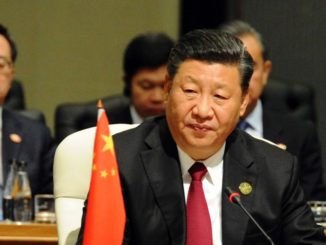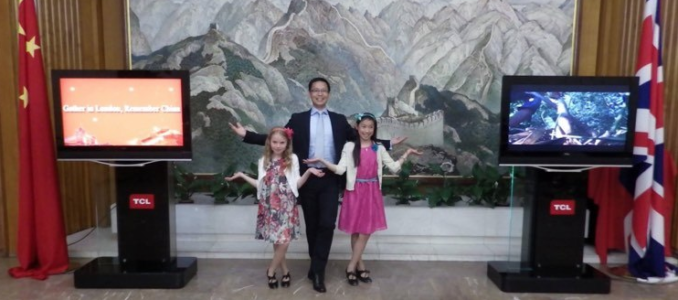
© Always Worth Saying, Going Postal 2021
China is one single indivisible territory containing one single indivisible people. It is the most populous nation on earth, the world’s second-biggest economy and has a longer continuous history than any other country – three thousand five hundred years and counting. So says His Excellency Ambassador Liu Xiaoming from a podium at the Chinese Embassy, Portland Place, London. A podium fronted by the circular emblem of the People’s Republic. As always, the symbolism is telling. Bounded by agriculture’s golden sheaths of rice and wheat, the bottom of the circle contains the cogwheel of industry. Above that, the Tiananmen Gate rests beneath four stars that represent the different social classes defined by Mao. At the very top, a much larger star gleams, that of the Chinese Communist Party, the CCP.
As the Ambassador speaks, his audience are zero degrees of separation from Xi Jinping, China’s all-powerful president and First Secretary of the Chinese Communist Party, the country’s founding and sole governing political party.
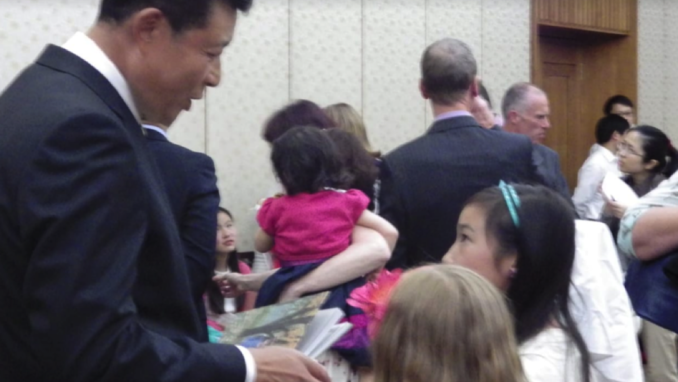
© Always Worth Saying, Going Postal 2021
Circulating after the speeches, the ebullient Ambassador Liu, alongside his diminutive and charming wife, Madam Hu Pinghua, fall into relaxed conversation with their guests. His Excellency congratulates the young ladies on their tap dancing and concedes he dabbled himself as a boy. He takes an enthusiastic interest in the girl’s ‘Qinzhou Children’ photo book. Beyond that, upon gentle probing, his language is measured, still diplomatic. Narratives remain set in stone. Resource hungry China’s controversial relationship with resource-rich Africa, far from being quasi-colonial, is defined as one of mutual self-help. China is herself still a developing nation, he assures me, hence her exemption from climate change targets obliged upon the West.
Away from Embassy receptions, narratives are reinforced on social media. Although Twitter is banned in China, the Chinese Communist Party, unlike the President of the United States, can not only still tweet, but tweet without being labelled as if its claims are disputed. Of a million Uighurs being re-educated in camps in Northern China’s Xinjiang province, Ambassador Liu suggests,
Don’t be blinded by ill-intentioned slanders and fabrications. Look at the numbers and facts. The #Chinese government protects the rights and interests of #Uygurs and all the other ethnic groups wherever they live in the country, including #Xinjiang.
Without fear of contradiction or censorship, China Xinhua News adds to his Twitter feed,
The population change in northwest China’s Xinjiang involves the overall improvement in population quality and is a voluntary choice made by people, says a recent study http://xhne.ws/JUg6f
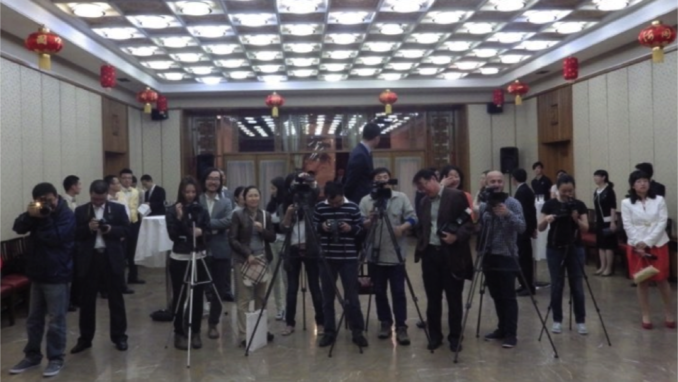
© Always Worth Saying, Going Postal 2021
Sixty-six-year-old Ambassador Liu will retire later this year, after an eleven-year posting in London. A career diplomat, he has served at embassies in the United States, Egypt and South Korea, punctuated by a government post in China’s Gansu province and a position on the Foreign Affairs Section of the CCP’s Central Committee.
Born in 1956, Liu was an infant during Mao’s catastrophic Great Leap Forward, a failed attempt at industrialisation and collectivisation of farming, which led to 56 million deaths. As a teen, he witnessed the Cultural Revolution when Maoist purges killed another one and a half million. 1
Although Great Britain initially recognised Communist China in 1950, it wasn’t until 1972 that the Court of St James exchanged ambassadors with the People’s Republic. The death of Mao in 1976 brought about the end of the Cultural Revolution and accelerated China’s opening up to the rest of the world. The pace of progress increased further under chairman Deng Xiaoping’s modernisations, from 1979 onwards. These ended China’s Soviet-style command economy and encouraged private enterprise and foreign investment. Deng’s reforms came at a time of relative global economic stability, being observed by a United States that was so far ahead of China that it was impossible to see the one-party Communist state ever becoming a threat. Although the rate of China’s growth continued to increase, the economic miracle only began after entry into the World Trade Organisation 2001, on advantageous terms.
With regular double-digit annual growth, the Chinese economy became bigger than Britain’s in 2004 and overtook Japan in 2010. Now second only to the USA as a global ecconomic player, China’s development has come at a price. Amongst others things; child labour in factories, slave labour, consumer product manufacturing in prisons, appalling levels of health and safety, dreadful hygiene, human rights abuses and environmental catastrophe.
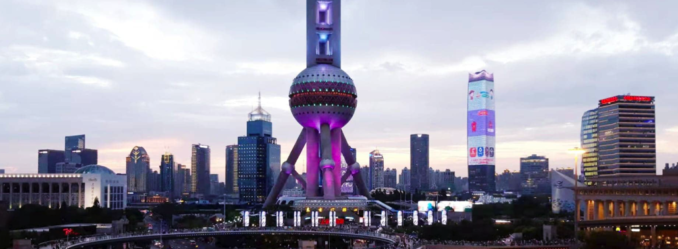
© Always Worth Saying, Going Postal 2021
On the upside, His Excellency’s speech could have mentioned that China now has the world’s biggest foreign exchange reserves, $3.1 trillion (in 2019) and is the world’s biggest recipient of inward investment, $253bn (in 2012). The country is also a big outward investor, $64bn (2012).[2]
Commentators expecting a Maslov’s hierarchy of increasing wealth leading to political change will have been disappointed. Under President Xi (2012-) the CCP’s grip has become much tighter. Not only is there still no parliamentary democracy in mainland China, but the elected Hong Kong Assembly has had its wings severely clipped. Business is not exempt.
A comprehensive 2019 Guardian article by Richard McGregor entitled, “How the State Runs Business in China”, includes the following, telling, paragraphs,
For a reliable benchmark about the power of the party in China, you only need to listen to wealthy entrepreneurs hold forth on politics. These otherwise all-powerful CEOs go to abject lengths to praise the party. To take a few companies listed in a single article in the South China Morning Post [SCMP], Richard Liu of e-commerce group JD.com predicted communism would be realised in his generation and all commercial entities would be nationalised. Xu Jiayin of Evergrande Group, one of China’s largest property developers, said that everything the company possessed was given by the party and he was proud to be the party secretary of his company. Liang Wengen of Sany Heavy Industry, which builds earthmovers, went even further, saying his life belonged to the party.
Ominously, a security law was passed in 2017 which places an obligation upon both citizens and subservient big business,
“any organisation and citizen shall support and cooperate in national intelligence work”.
Outside of China, alarms bells ring aloud as the Chinese government and Chinese multinationals are in a position to interfere with the domestic politics, economics and technology of other countries.
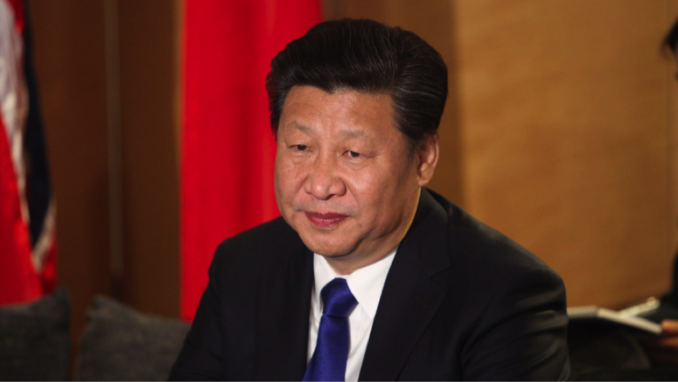
President of China, Xi Jinping arrives in London, 19 October 2015,
Foreign, Commonwealth & Development Office – Licence CC BY-SA 2.0
Even the most generous observer must conclude that President Xi and the CCP intend China, her people and her industries to be one entity with one self-interested common purpose. What influence, therefore, can China exert on the politics of our own country? And how, if at all, can our politicians and diplomats dance with the Chinese dragon while furthering our own national well being?
***
The first British Prime Minister to visit China was Conservative Ted Heath, who met Chairman Mao in Bejing (then known as Peking) in 1974. Subsequently, Mr Heath visited China a further 30 times. In 1999, we found out why. The Independent newspaper reported that Heath had, for many years, been a paid associate of the Chinese Government-owned shipping company, China Ocean.
This was not declared to the House of Commons member’s list of interests. Heath claimed a declaration was unnecessary as he hadn’t used parliament as part of this business relationship. He also refused to say how much he’d been paid, stating that it was a “private matter”. Mr Heath was also revealed to be an adviser on China for investment funds run by Dresdner Kleinwort Benson and CGU.
Even before entering parliament, John Major had visited China as head of the PR department at Standard Chartered Bank. Prime Minister Major visited again in 1991, to sign a memorandum of understanding regarding the future of Hong Kong. Despite being the first major foreign leader to visit China since the 1989 massacre of pro-democracy protestors in Tiananmen Square, humans rights were not on the agenda. After leaving office, Mr Major moved to the investment house, Carlyle Group, being appointed Chairman of Carlyle Europe in 2001. His responsibilities also included serving on Carlyle’s Asia Advisory Board. In 2004 Carlyle moved into China having established a $1billion Shanghai-based buyout and venture investment fund.
After a successful Hong Kong handover in 1997, with the Chinese committed to a ‘one country two systems’ constitutional principle, Anglo-Sino relations appeared to enter a Golden Era, not least for politicians.
Mr Major’s successor as Prime Minister, Tony Blair, stood down from parliament in 2007. By 2010, Mr Blair was a Middle East peace envoy and a £40,000 a month middle man brokering deals between PetroSaudi and the China National Petroleum Corporation. [3] Nowadays, Mr Blair’s New Labour fellow traveller, Lord Peter Mandelson, is head of the Great Britain – China Centre.
More recently, in a press release dated 31st May 2019, from their offices in Hamilton, Bermuda, big tech company Afiniti announced that former Prime Minister David Cameron had been appointed chair of its advisory board tasked with,
curating and overseeing the strategic guidance provided by the Advisory Board to Afiniti’s management team and Board of Directors. As the opportunities and challenges associated with artificial intelligence become increasingly clear, Mr Cameron’s experience of political leadership through periods of complexity, both domestically and on the international stage, will be invaluable as Afiniti focuses on driving growth by delivering tangible benefits to clients.
According to their website, Afiniti are,
“reinventing [with computer software] how businesses communicate with their customers. It uses artificial intelligence to identify subtle and valuable patterns of human interaction in order to pair individuals on the basis of behaviour, leading to more successful interactions and measurable increases in enterprise profitability.”
Afiniti has a presence in Shenzen, China’s Silicon Valley, where one of their biggest clients is the controversial Chinese telecommunications giant Huawei.
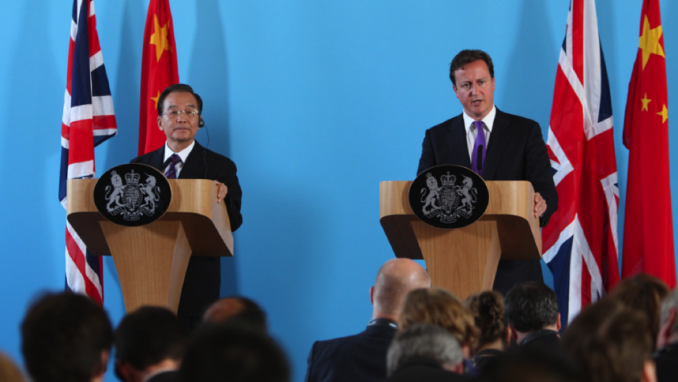
UK-China Summit press conference,
Foreign, Commonwealth & Development Office – Licence CC BY-SA 2.0
After stepping down as Prime Minister in 2016, Cameron also announced the setting up of a billion-dollar fund to invest in Anglo-Chinese industry, particularly the Beltway infrastructure project which will modernise transport links between China and her near neighbours. Mr Cameron’s business partner in this enterprise is the interesting Peter Gummer, Baron Chadlington, who is a Tory Party donor and the brother of former Cabinet Minister John (now Lord) Gummer. Peter Gummer was also President of the Witney Conservative constituency association when Cameron was the constituency MP.
Gummer made his money in public relations, particularly at Huntsworth. In April 2013, Bluefocus, a leading Chinese PR company invested £36.5 million in Huntsworth when Gummer was the chairman. When Prime Minister Cameron made an official visit to China in December 2013, Gummer accompanied him. [4] Previously, Gummer’s daughter, Naomi, had been controversially given a civil service job at Jeremy Hunt’s Department for Culture.
Is there a Chinese proverb about a political establishment of interlocking circles? There should be.
Jeremy Hunt’s wife, Lucia (not her real name) is Chinese. In recent legal documents, Mrs Hunt appears as, declares herself as, and signs herself as, a Ms Ge Guo, a British resident and Chinese national. Mr and Mrs Hunt met when she was employed by Warwick University to recruit overseas Chinese students. Mr Hunt was similarly employed having founded ‘Hotcourses’, an educational publishing company which compiled course guides and lists for international students. Hotcourses directors included TV presenter Sir David Frost and, in a symmetry worthy of an East Asian country’s national emblem, Peter Gummer.
Hunt’s old employees are less than complimentary towards him but do note his fascination with China and the far East.
In 2002, that fascination paid off when the British Council awarded a contract to a consortium, which included Hotcourses, with the aim of increasing the number of profitable overseas students coming to study in Britain. And it worked, with the number of Chinese students coming here increasing by 40% in the following two years. When Hotcourses was sold to Australian company, IDC, in 2017, Mr Hunt pocketed a cool £14.5million pounds from the sale.
As for Lucia Hunt (NHRN), a 2019 Daily Express article contradicted recent legal documents by claiming that she is a British Citizen. It is possible to hold both a British and Chinese passport. However, since China (one single, indivisible people) does not recognise dual nationality, they will not recognise your British passport. This means that you will have to apply for an exit visa on your Chinese one in order to leave the People’s Republic. If tempted to bluff your way out with your British passport, bear in mind that the CCP know more about you than your mother does, thanks to a giant artificial intelligence information hoovering database sold to them by Mr Cameron and Afiniti.
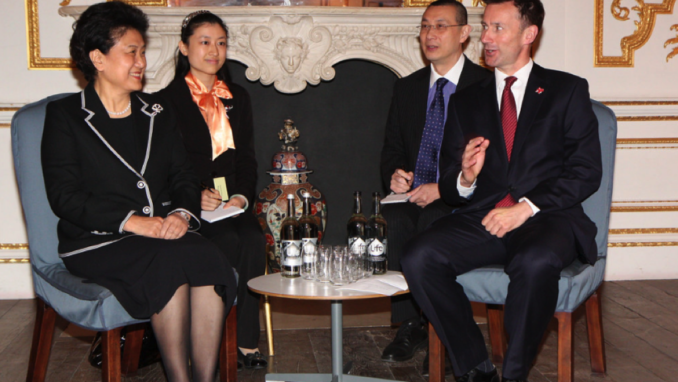
Culture Secretary Jeremy Hunt and Chinese State Councillor Liu Yandong,
Foreign, Commonwealth & Development Office – Licence CC BY-SA 2.0
Might a cynic suspect that Mrs Hunt uses her Chinese passport to conceal her husband’s declarable business interests? Surely not? On 19th September 2017, 8 months after the sale of Hotcourses, Mare Pond Properties Limited was incorporated at Companies House, its sole director being Mrs Hunt. However, she appears on the registration, and signs it, as Ms Ge Gou, a Chinese citizen, resident in the UK. There is a flurry of legal activity in March 2018, including Mr Hunt registering as an ‘individual with significant control’. However, the document also states that Mr Hunt’s control became registerable six months earlier, on the day that Ms Ge Gou had registered the company. Why had Mr Hunt, all of a sudden, registered this interest and backdated it by six months? Because he’d been caught, that’s why. A spokesman for Mr Hunt was happy to inform prying eyes that these were “honest administrative mistakes”, “Jeremy’s accountant made an error”, “genuine oversight”, “already rectified”. A Downing Street spokesman added that the ministerial code had not been breached.
In case you’d like to avoid them, Mr and Mrs Hunt’s accountants were the bumbling amateurs at Grunberg and Co, then of 10-14 Accommodation Road, Golders Green, North London. According to his own biography, founder David Grunberg is a dedicated board member of the Hotcourses Foundation and Patient Safety Watch. In case we hadn’t already guessed, Mr Grunberg helpfully informs us that,
the ever-growing Patient Safety Watch, [was] established by former Health Secretary Jeremy Hunt MP,
A few months after the Mare Ponds mini-scandal, in July 2018, the clodhopping Jeremy Richard Streynsham Hunt (by then Foreign Secretary), was in Beijing for talks about post-Brexit trade. During which he accidentally told the Chinese Foreign Minister, Wang Yi, that Mrs Hunt was Japanese. To contextualise the offence caused, via body count, up to 22 million Chinese deaths occurred during the Sino-Japanese war of 1937-1945.
Simultaneous with the British Council and Hotcourses, the Chinese government had also been taking an interest in overseas higher education. Their Confucius Institute was founded in 2004, the first branch opening in Seoul, South Korea. According to wiki the,
Confucius Institutes (CIs) promote and teach Chinese culture and language around the world. CIs develop Chinese language courses, train teachers, hold the HSK Examination (Chinese proficiency test), host cultural and artistic presentations, and provide information about contemporary China.
As such, CI begins to look like a Chinese version of the British Council. The number of branches has risen exponentially, by 2018 there were 525 CI’s and 1,113 Confucious Classrooms established in 138 countries. However, the CI has attracted criticism and controversy including, according to wiki,
administrative concerns about finance, academic viability, legal issues, and relations with the Chinese partner university, as well as broader concerns about improper influence over teaching and research, industrial and military espionage, surveillance of Chinese abroad, and undermining Taiwanese influence.
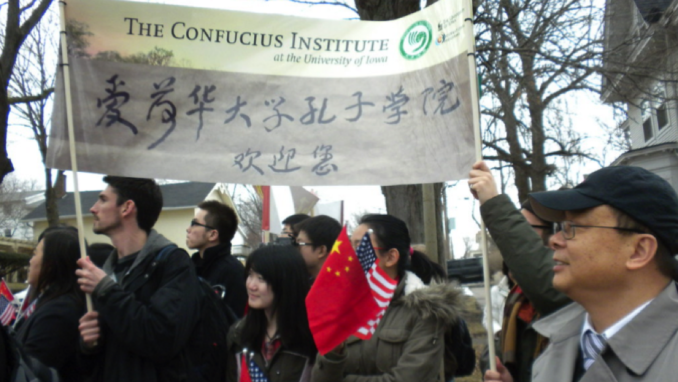
THe Confucius Institute broughta banner to greet Xi Jinping,
UI International Programs – Licence CC BY-SA 2.0
The conflict of interests between the Confuscious Institute and its overseas hosts is indicative of a Golden Era that has soured. In part two, we shall give it another good hard kick.
References
[1] History.com China Timeline
[2] Stastistica
[3] The Guardian, “Tony Blair courted Chinese leaders for Saudi prince’s oil firm”
[4] Peter Hitchens Blog
Acknowledgements
Afiniti.com
Carlyle.com
The Independent
The Financial Times
© Always Worth Saying 2021
The Goodnight Vienna Audio file

